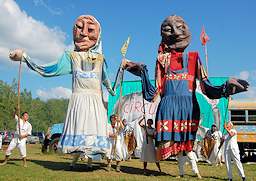Fifth Estate Collective
Farewell Elka Schumann
Co-Founder of Bread & Puppet Theater
Bread and Puppet Theater’s Elka Schumann died this past August, at the age of 85. She and her partner, Peter Schumann, co-founded the Bread and Puppet Theater, the innovative and radical theater group, in New York City in 1963.

The troupe was an integral part of the exciting social and cultural ferment created by the civil rights, counter-culture and anti-Vietnam War movements of the time.
The group became known for its social justice themes made memorable by the use of giant puppets with actors inside, which they often brought to peace rallies and protest marches. Performances were also enlivened with small puppets, hand puppets and other low-tech props, such as their crankie narrated picture shows.
The crankie was a box with a roll of paper or fabric painted with pictures that told a story, cranked by hand past an open frame. The person turning the crank narrated and even provided sound effects.
The theater used these tools to call attention to social injustices such as housing inequality, exploitation of workers and the class nature of the draft for the Vietnam War. They also performed plays by the ardent Communist German playwright Bertolt Brecht and shows based on the writings of Emma Goldman.
The bread in their name comes from the simple loaves of rye bread and an aioli they served at their performances.
The troupe performed in New York and in national and international theater festivals for many years. It moved to Glover, Vermont in 1970, continuing to perform widely, as well as holding a Bread and Puppets Festival on their farm for more than 15 years.
Elka grew up learning about the aspirations for social justice of communism and the authoritarian rule of the actually existing Russian Communist elites. She was born in the Soviet Union in 1935, to a Russian mother, Maria Ivanova (Dikareva), and a U.S. citizen father, John Scott, the son of Scott Nearing, a well-known pacifist and environmentalist.
Scott immigrated to the Soviet Union in 1932 hoping to contribute to the development of the communist experiment. He fell in love and married.
The couple had two children, Elka and Elena. Scott lived and worked in Russia for almost a decade, but by the late 1930s, became disillusioned with the Stalinist regime, especially with the purges and show trials.
At the beginning of June 1941, Soviet authorities announced that Scott was being expelled from the country for allegedly publishing slanderous articles about the regime’s foreign policy. The United States Ambassador helped Scott to obtain exit visas for his wife and children so they could leave with him and resettle in the U.S.
Elka developed a personal understanding of the Cold War by observing the contentious debates between her father, who was moving to a right- wing anti-communist position, and her paternal grandfather, Scott Nearing, who persisted in being a communist sympathizer, despite recognizing some shortcomings.
After high school Elka attended Bryn Mawr College, where she studied art history. For her junior year abroad in 1956, she went to Munich, Germany, where she met Peter Schumann, a creative and inspiring artist. They fell in love and married.
In 1959, Elka and Peter moved to New York City where they joined the avant-garde scene that included many anarchist individuals and groups, such as the Living Theater.
The group, including Peter, is still based in Glover and continues performing their amazing and often startling creations nationally and internationally.
Some of the performances use huge puppets; others employ smaller ones. The themes are diverse, but always denounce injustice, capitalism, and authority in a creative way.
The troupe follows the tradition of anarchist theater, emphasizing the importance of creativity as a fundamental part of anarchy.
